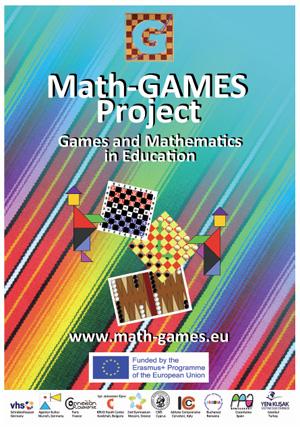Math-GAMES - Games And Mathematics in Education for adultS
Compendiums, Guidelines and Courses for Numeracy Learning Methods
Based on Games
Erasmus+ Project No.: 2015-1-DE02-KA204-002260
The project "Math-GAMES - Games And Mathematics in Education for Adults – Compendiums, Guidelines and Courses for Numeracy Learning Methods Based on Games" is producing a compendium and a guidebook in 9 languages, which should give the answer to two main questions while rising numeracy in education:
1. How can we reduce the number of under skilled adults to promote social integration and participation into our society?
- How can we increase incentives for adult training by using games?
- How can we offer tailored learning opportunities to individual learners by using games?
- How can we provide information on access to the services of adult learning?
2. How can we save traditional and famous games in different countries from a loss?
- During the project, the project partners will collect real examples, in which playing traditional games could bring low-skilled people out of isolation and helps participating in our society. In this part the mobility of trainers is necessary. In parts normal skilled people will play these games together with lower-skilled persons. The results are the "Math-GAMES Compendium of Famous Traditional Games", which are books in 9 languages (BG, DE, EN, ES, FR, GR, IT, RO, TR).
- After that the partners of the project will prove, how traditional games could be implemented in their learning program for a better understanding, especially for lower-skilled people. The result are the “Math-GAMES Numeracy Learning Guidelines” in 9 languages (BG, DE, EN, ES, FR, GR, IT, RO, TR).
- At the third part of the project the project partners will prove by doing and testing during real courses and seminars that playing games between people with different skills assist the social integration and thus traditional games will be saved from a loss by transferring it to other people. The result is a "Math-GAMES Teacher Training Course and Seminar", which is held for the next 10 years in different countries. The e-presentation, the seminar and the teacher training course are published in English.
- Finally the "Math-GAMES Testing and Evaluation Report" is published. It is a report about the project, the work, the activities during the lessons, the competitions in schools, the meetings and the evaluation. The Math-GAMES Project Report is published in English.
In total the project gives examples of good practice and hints for creating learning courses for using traditional games with normal and lower-skilled people fighting numeracy.
At the end of this project “Math-GAMES - Games And Mathematics in Education for Adults – Compendiums, Guidelines and Courses for Numeracy Learning Methods Based on Games" we have produced 9 compendiums and 9 guidebooks, both are available as printed books and e-books, a website, in which we will present all the material, guidelines for a teacher training course and a detailed report about e.g.:
- A big part with a list of different traditional transnational games (photos, game instructions), which can provide social integration. Traditional games can be board games, card games, role plays, acts, folk games involving dramatics, e. g. but not computer games.
- A general, more theoretical short part about the theme: “Social integration and participation of lower-skilled people by using traditional games”. It should show learners in adult education, how precious it can be to add games in teaching lessons and offer so tailored learning opportunities to individual learners.
- Some example of best practice from the participating countries and organizations, how lower-skilled people are socially integrated by using traditional games (photos and description of the activity, place and country, effects on the people)
- Some example of best practice from the participating countries and organizations, how lower-skilled people is getting information on access to lifelong learning services in the local adult education.
- A description of the origin of games and their symbolic significance, e.g. games about “capture and release”, birth, ritual, etc.
- Interviews of participating people in their homes, care residences, etc. so that a compendium of authentic testimonies is created.
- “Games in performance” in front of small audiences of people, who are then given the opportunity to interpret the games and to perform them with the lower-skilled participants on their own, with the participants as audience.
- Filming, photographing and documentation of parts of the project to upload on our website.

